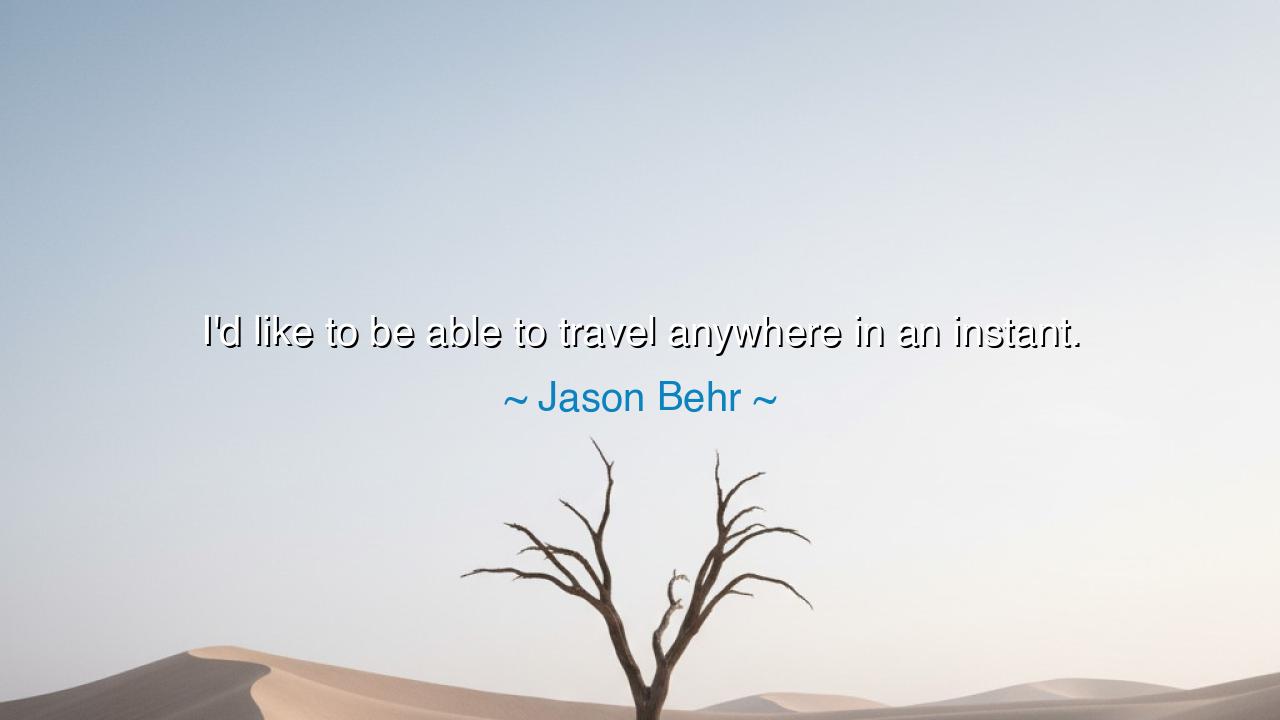
I'd like to be able to travel anywhere in an instant.






So spoke Jason Behr, actor and dreamer, giving voice to a yearning shared by many across the ages: “I’d like to be able to travel anywhere in an instant.” Though his words sound like the wish of a modern man, touched with the science fiction of our time, they carry within them the eternal longing of humankind—the desire to transcend distance, to conquer delay, to bridge the gap between where we are and where we long to be.
The wish to travel instantly is not new. In the myths of the ancients, we find gods and heroes who could move faster than the eye, leaping across seas and mountains. Hermes, messenger of the Greeks, wore winged sandals that carried him wherever he willed. In the sagas of the East, sages were said to vanish from one place and reappear in another, borne not by steps but by spirit. Behr’s words echo this same longing: that the obstacles of distance be dissolved, and that the heart might unite with its desires without delay.
This yearning arises from more than impatience. It is born of love and of curiosity. To travel instantly is to reach family when they are in need, to see wonders the world holds without the barrier of miles, to embrace opportunity before it slips away. How many through history have felt the ache of separation? Lovers torn by war, parents parted from children, exiles far from their homeland. All of them, had they possessed such power, would have chosen to cross the world in a heartbeat to be reunited with what they held dear.
History offers us glimpses of this longing satisfied in part. When the steam engine was born, men marveled that they could cross lands in days instead of weeks. When flight took to the skies, the oceans that once took months to traverse were conquered in hours. When the telegraph and later the internet carried words across continents instantly, it was as if thought itself had learned to travel. Each of these inventions was a step toward the dream Behr voiced—a dream humanity has always pursued: to bring near what is far.
And yet, there is a lesson hidden within. For though we may long to escape delay, it is often the journey itself that shapes us. Odysseus’ voyage was not only about reaching Ithaca, but about the wisdom gained along the way. Pilgrims who traveled for months to sacred shrines found transformation in the very act of walking. If we could move instantly, what lessons of patience, endurance, and discovery might we lose? Thus, the wish to travel instantly carries both blessing and warning: swiftness brings closeness, but it may rob us of growth.
The teaching here is not to dismiss the longing, but to balance it. Yes, seek ways to bridge distance—through technology, through love, through effort. But do not despise the road. Walk it with courage, and let its trials strengthen you. When delay burdens you, turn it into preparation. When distance grieves you, let it deepen your appreciation for reunion. The instant may satisfy the moment, but the journey enriches the soul.
Practically, this means embracing both the tools that connect us and the virtues that sustain us. Write to those you cannot see. Call them, if you cannot hold them. And when you do travel, do not see the journey as wasted time, but as sacred time—a chance to learn, to reflect, to encounter the unexpected. In this way, you fulfill both longings: the longing to reach, and the longing to grow.
Thus, Jason Behr’s simple words become ancient wisdom: “I’d like to be able to travel anywhere in an instant.” They remind us that humanity has always sought to overcome distance, yet also that there is meaning in the waiting, strength in the struggle, and beauty in the road itself. Let us then hold both truths together: to dream of the instant, but to honor the journey. For in this balance lies the fullness of life’s great adventure.






AAdministratorAdministrator
Welcome, honored guests. Please leave a comment, we will respond soon